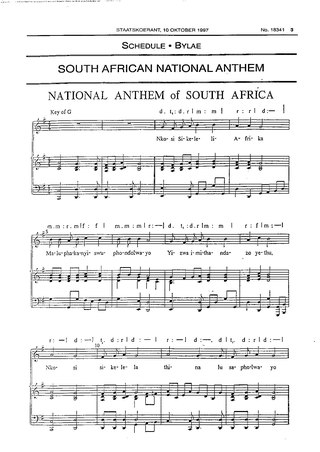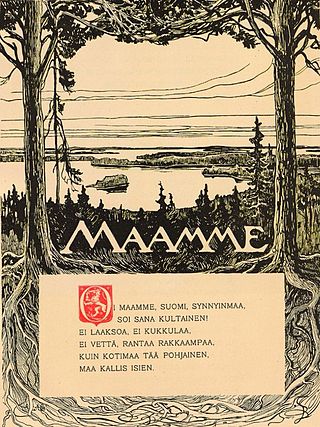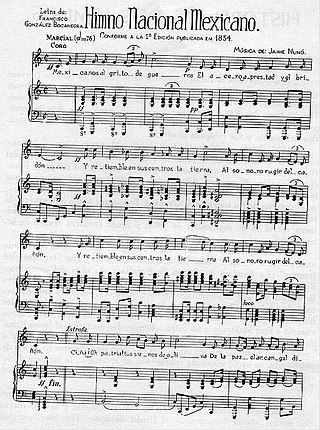Related Research Articles
An anthem is a musical composition of celebration, usually used as a symbol for a distinct group, particularly the national anthems of countries. Originally, and in music theory and religious contexts, it also refers more particularly to short sacred choral work and still more particularly to a specific form of liturgical music. In this sense, its use began c. 1550 in English-speaking churches; it uses English language words, in contrast to the originally Roman Catholic 'motet' which sets a Latin text.

Corsican is a Romance language consisting of the continuum of the Italo-Dalmatian dialects spoken on the Mediterranean island of Corsica, France, and in the northern regions of the island of Sardinia, Italy, located due south.

The "Deutschlandlied", officially titled "Das Lied der Deutschen", has been the national anthem of Germany either wholly or in part since 1922, except for a seven-year gap following World War II in West Germany. In East Germany, the national anthem was "Auferstanden aus Ruinen" between 1949 and 1990.

"Poland Is Not Yet Lost", also known as the "Dąbrowski Mazurka", and the "Song of the Polish Legions in Italy", is the national anthem of Poland.

The national anthem of South Africa was adopted in 1997 and is a hybrid song combining extracts of the 19th century Xhosa hymn "Nkosi Sikelel' iAfrika" and the Afrikaans song that was used as the South African national anthem during the apartheid era, "Die Stem van Suid-Afrika", with new English lyrics.

"Maamme" is the de facto national anthem of Finland. The music was composed by the German immigrant Fredrik Pacius, with original Swedish lyrics by Johan Ludvig Runeberg. It was first performed with the current melody and lyrics on 13 May 1848. Originally, it was written for the 500th anniversary of Porvoo, and for that occasion it was Runeberg himself who wrote the music.

The "Mexican National Anthem", also known by its incipit "Mexicans, at the cry of war", is the national anthem of Mexico. The lyrics of the national anthem, which allude to historical Mexican military victories in the heat of battle and including cries of defending the homeland, were composed by poet Francisco González Bocanegra after a Federal contest in 1853. Later, in 1854, he asked Jaime Nunó to compose the music that now accompanies González's poem. The national anthem, consisting of ten stanzas and a chorus, effectively entered into use on September 16, 1854.

The "Hymn to Liberty", also known as the "Hymn to Freedom", is a Greek poem written by Dionysios Solomos in 1823. It consists of 158 stanzas in total. It was set to music by Nikolaos Mantzaros in 1828 and is the longest national anthem in the world by length of text.

"Ja, vi elsker dette landet" is the Norwegian national anthem. Originally a patriotic song, it came to be commonly regarded as the de facto national anthem of Norway in the early 20th century, after being used alongside "Sønner av Norge" since the 1860s. It was officially adopted in 2019.

Filippo Antonio Pasquale de' Paoli was a Corsican patriot, statesman, and military leader who was at the forefront of resistance movements against the Genoese and later French rule over the island. He became the President of the Executive Council of the General Diet of the People of Corsica and wrote the Constitution of the state.
A national anthem is a patriotic musical composition symbolizing and evoking eulogies of the history and traditions of a country or nation. The majority of national anthems are marches or hymns in style. American, Central Asian, and European nations tend towards more ornate and operatic pieces, while those in the Middle East, Oceania, Africa, and the Caribbean use a more simplistic fanfare. Some countries that are devolved into multiple constituent states have their own official musical compositions for them ; their constituencies' songs are sometimes referred to as national anthems even though they are not sovereign states.

The "Swiss Psalm" is the national anthem of Switzerland.

The "Brazilian National Anthem" was composed by Francisco Manuel da Silva in 1831 and had been given at least two sets of unofficial lyrics before a 1922 decree by president Epitácio Pessoa gave the anthem its definitive, official lyrics, by Joaquim Osório Duque-Estrada, after several changes were made to his proposal, written in 1909.

"Nkosi Sikelel' iAfrika" is a Christian hymn originally composed in 1897 by Enoch Sontonga, a Xhosa clergyman at a Methodist mission school near Johannesburg.

Outside France the island of Corsica is perhaps best known musically for its polyphonic choral tradition. The rebirth of this genre was linked with the rise of Corsican nationalism in the 1970s. The anthem of Corsica is "Dio vi Salvi Regina".

Corsica is an island in the Mediterranean Sea and one of the 18 regions of France. It is the fourth-largest island in the Mediterranean and lies southeast of the French mainland, west of the Italian Peninsula and immediately north of the Italian island of Sardinia, the nearest land mass. A single chain of mountains makes up two-thirds of the island. As of January 2024, it had a population of 355,528.

"Rufst du, mein Vaterland" was the former national anthem of Switzerland. It had the status of de facto national anthem from the formation of Switzerland as a federal state in the 1840s, until 1961, when it was replaced by the Swiss Psalm.

Italian irredentism in Corsica was a cultural and historical movement promoted by Italians and by people from Corsica who identified themselves as part of Italy rather than France, and promoted the Italian annexation of the island.

The Corsican Republic was a short-lived state on the island of Corsica in the Mediterranean Sea. It was proclaimed in July 1755 by Pasquale Paoli, who was seeking independence from the Republic of Genoa. Paoli created the Corsican Constitution, which was the first constitution written in the Italian language. The text included various Enlightenment principles, including female suffrage, later revoked by the Kingdom of France when the island was taken over in 1769. The republic created an administration and justice system, and founded an army.

The French conquest of Corsica was a successful expedition by French forces of the Kingdom of France under Comte de Vaux, against Corsican forces under Pasquale Paoli of the Corsican Republic. The expedition was launched in May 1768, in the aftermath of the Seven Years' War. A French expeditionary force was landed on the island of Corsica, then ruled by the Corsican Republic. Marching inland to overcome any Corsican opposition, the French force initially suffered an unexpected defeat at the Battle of Borgo. But a new commander, the Comte de Vaux, was appointed to lead the expedition, and decisively defeated the Corsican army at the Battle of Ponte Novu in 1769, effectively bringing an end to Corsican resistance.
References
- 1 2 "Antonini, Paulu, L'origine di u Dio vi Salvi Regina – les origines du Dio vi Salvi Regina, Accademia corsa". Archived from the original on 4 June 2012. Retrieved 6 September 2006.
- ↑ Redazione (8 December 2015). "Dio vi salvi Regina, un canto mariano inno della Nazione Corsa". Corsica Oggi (in Italian). Retrieved 3 July 2019.